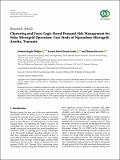| dc.contributor.author | Philipo, Godiana | |
| dc.contributor.author | Jande, Yusufu | |
| dc.contributor.author | Kivevele, Thomas | |
| dc.date.accessioned | 2021-03-04T07:37:47Z | |
| dc.date.available | 2021-03-04T07:37:47Z | |
| dc.date.issued | 2021-02-15 | |
| dc.identifier.uri | https://doi.org/10.1155/2021/6614129 | |
| dc.identifier.uri | https://dspace.nm-aist.ac.tz/handle/20.500.12479/1137 | |
| dc.description | This research article published Hindawi | en_US |
| dc.description.abstract | Permanent electricity availability should not be taken for granted since grid sustainability and reliability are at stake when there is no balance between supply and demand. This paper employs a load balancing demand-side management (DSM) approach based on fuzzy logic, considering the low energy users who have insignificant influence on system peaks. Through the K-means clustering algorithm, suitable candidates for DSM are identified, and the control mechanism is based on energy utilization and load priority. The results reveal that about 3.7 kW in power saving was achieved per month. This result indicates that, with a proper energy management strategy for an individual customer, almost a flatter load profile and power saving can be achieved. | en_US |
| dc.language.iso | en | en_US |
| dc.publisher | Hindawi | en_US |
| dc.subject | Research Subject Categories::NATURAL SCIENCES | en_US |
| dc.title | Clustering and Fuzzy Logic-Based Demand-Side Management for Solar Microgrid Operation: Case Study of Ngurudoto Microgrid, Arusha, Tanzania | en_US |
| dc.type | Article | en_US |

